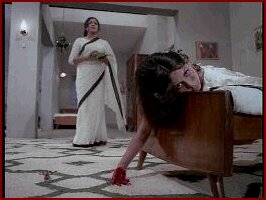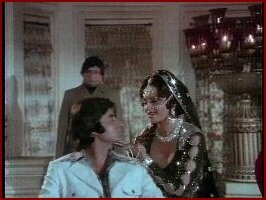|
Be-Sharam
If you wanted to, it seems like you could draw up a sort of family tree of the films Indian superstar Amitabh Bachchan made during his late seventies to mid eighties prime, tracing each of those movies' origins along three very distinct lines, each leading back to a particular career-defining blockbuster that provided the template for much of what was to come. Of course, while Bachchan would star in films that were virtual remakes of Deewaar, Sholay and Don over the course of his career, the lines leading back to those three classics would not always be perfectly straight. For one would also have to consider films like 1978's Be-Sharam, which draw upon elements of all three. Be-Sharam probably bears the strongest resemblance to 1978's Don, because, like that film, it's a tale, set against a funky urban backdrop, of a peaceful innocent masquerading as a suave underworld figure. At the same time, like the "angry young man" movies that descended from Deewaar, it includes the theme of the martyred father - his life taken and good name tarnished by the forces of corruption - whose fate motivates the actions of the main character (Bachchan). Finally, as in Sholay, Bachchan is faced with a larger-than-life, seemingly unstoppable villain, who is here played by the very same actor who essayed that role in Sholay, Amjad Khan, who here makes just one of the numerous bad guy turns his iconic portrayal of Sholay's Gabbar Singh appears to have doomed him to.
Now, what Be-Sheram does with these combined elements is nothing original, but it does distill them quite nicely - making the violence nice and bloody, the men's wear as funky-hideous as you could ask for - and wraps them up in a nice, fairly tight little package. In fact, while lacking the sheen and dramatic flair of its more crafted antecedents, it may exceed some of them in terms of consistent - by Bollywood standards, mind you - energy and pacing. All of which is to say that, yes, Be-Sheram is a by-the-numbers Amitabh action movie, but it's also a very good by-the-numbers Amitabh action movie. In Be-Sheram, Bachchan plays Ram, a humble insurance agent whose father, a righteous man and dedicated pacifist, manages to get elected to public office despite ample interference from the aforementioned forces of corruption. One of these shadowy figures behind the scenes is Prince Digvijay Singh (Khan), who, like the seedy remnant of monarchy that he is, finds the idea of adapting his lifestyle to one amenable to the rule of law and democratic will distasteful. Singh dispatches his sister, the Princess Rinku (Sharmila Tagore) to insinuate herself into young Ram's life by posing as a slumming college student, and thus keep tabs on the family's movements. Of course, Rinku quickly falls in love with Ram in earnest, leaving the Prince to consider plan B.
Since no honest man can survive long in such a hotbed of malfeasance, the enemies of Ram's father soon succeed in embroiling him in a manufactured scandal and driving him from office, after which he dies in an apparent suicide. The grieving Ram is promptly called to the office of the police commissioner (played by Iftekhar, who played a virtually identical role in Don), who informs him that his father's death was actually a murder, and that it was perpetrated by the forces of a mysterious drug smuggling kingpin known only as Mr. Dharamdas. Furthermore, the commissioner tells him, the authorities have reason to believe that Mr. Dharamdas and the Prince are one in the same, but have yet to find the proof, since the base of his smuggling operation remains hidden. Being that the grieving son of a murder victim who has no training in law enforcement is the ideal choice to take part in a delicate undercover operation, the commissioner asks Ram to pose as a fellow smuggler in order to gain the Prince's confidence and get the information needed to bring him in. The commissioner makes some reference to giving Ram some kind of "training" which we don't actually get to see, but, the next time we see Ram, it's obvious that his training mainly involved him learning how to be a seventies-style badass. Posing as a South African diamond smuggler with the very un-South African name of Chandrashekar, Ram glides through the upper reaches of the underworld swathed in hip-hugging seventies finery with fists always at the ready to do his talking. Of course, everyone is fooled, including, initially, Princess Rinku - because, I suppose, exact duplicates of people are always turning up in these movies, and hence pose no particular cause for concern. Now armed with professional police training in suavity and sweet talk, Ram/Chandrashekar sets about romancing both Rinku and the Prince's mistress Manju in order to gain access to the inner circle, thus setting the stage for his confrontation with the Prince.
And the Prince, as portrayed by Amjad Khan, is a winning amalgam of all of that actor's most time-tested villainous tics, blessed with a sweaty brow, leering eyes, and a tendency toward bouts of unhinged giggling. Khan is a master of a particular style of slow-burn, maniacal tantrum, which starts out quietly and tentatively, with a hint of wounded sincerity, then subtly becomes more taunting until, suddenly, like a Pixies song, it burst into full blown homicidal rage. In fact, just as Be-Sharam is a workmanlike distillation of a certain type of Amitabh movie, Khan's performance in it is a workmanlike distillation of the type of performances he typically gives in those movies. Which is not to say that the Prince is a generic character, by any means. For one, his obsessive fondness for snakes and trademark use of cobras to dispatch his enemies both sets him apart from his peers and makes for some of the film's best moments. Scattered among the cobra killings, fist fights, and Amitabh's modeling of the latest fashions, Be-Sharam, of course, features musical numbers (written by Kalyanhi-Anandji, the team also responsible for Qurbani), probably the best of which is a climactic piece featuring Bollywood dance queen Helen. Leading us into the film's explosive final act, this bit follows something of a tradition for such numbers, in which the hero sits impassively listening while an anonymous performer sings about all of the bad things that are about to happen to him. Strangely enough, this song follows not too far on the heels of one in which Ram similarly watches Princess Rinku performing in a pageant and is struck by the fact that she is singing about how she has seen through his disguise. Helen, similarly, sings of how Ram's cover has been blown - and with much more at stake - but this time the message is lost on him. Without spelling out too much, the consequence of his heedlessness leads to a prolonged brawl involving a hidden lair beneath a cemetery, a tiger pit, snake wrasslin' and, of course, Ram's mom.
While comparatively lean, Be-Sharam still bulges in places with the type of padding that we've come to rely on from Bollywood (how else, after all, would the film reach its full two-and-a-half-hour running time?). Probably the most obvious example of this is the screen appearance by the film's director, Deven Verma, who not only plays Ram's comic relief buddy, Laxman, but also Laxman's comic relief mom and comic relief dad, none of whom seem to have much utility in terms of the actual story - and whose comedic necessity in a film where a grown man wears a polka dot tuxedo with a straight face is doubtful at best. Despite this, however, Verma deserves credit as a director for his efforts elsewhere to streamline Be-Sharam, especially in his treatment of the film's elements of family drama - usually something of a narrative log-jam in these action films - which are here nicely integrated within the larger plot. Further serving to grease Be-Sharam's narrative wheels is the fact that, while it cribs elements from some of Amitabh's most iconic films, unlike those films, it doesn't seem to have much in the way of larger themes of its own that it's trying to put across. As such, it can simply use it's resemblance to those other films as a terse signifier of those themes (the fetters of family honor, the value of friendship and community, etc.), while it goes briskly about its real business of being a violent and somewhat trashy little potboiler. This, of course, gives the movie something of a throwaway feel, but that just contributes all the more to it being such a fun experience. After all, if you're reading this review in the first place, you're well aware of the fact that a movie doesn't need to be a classic to be great. And while Be-Sharam is certainly no substitute for Deewaar or Sholay, there is something to be said for how it so compactly serves up the undiluted joys of Amitabh at his most funky and fightingest.
- Todd Stadtman 1/4/08
|
||
|
All text content � Copyright 2007-2008 Todd Stadtman. All rights reserved. |













